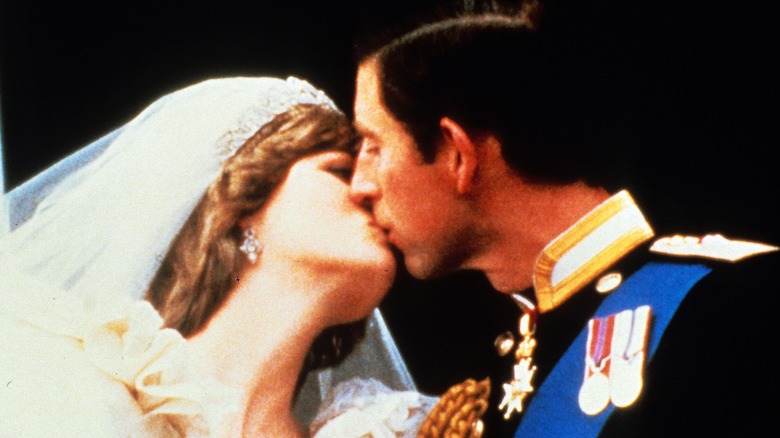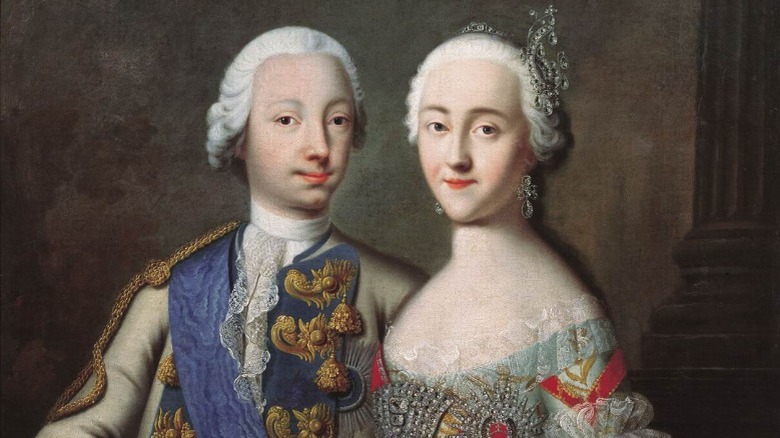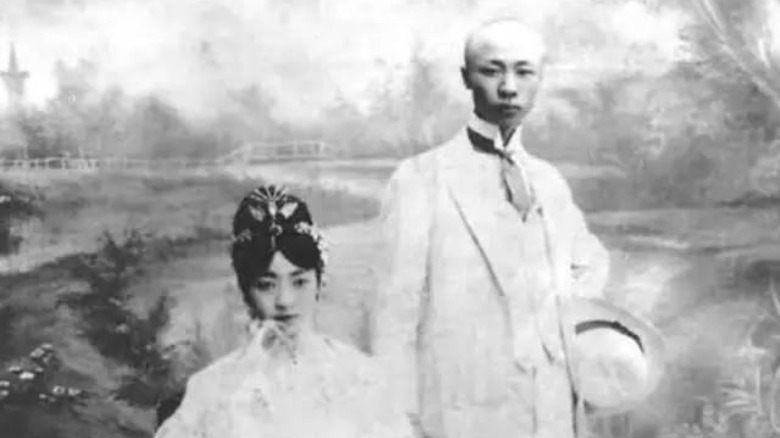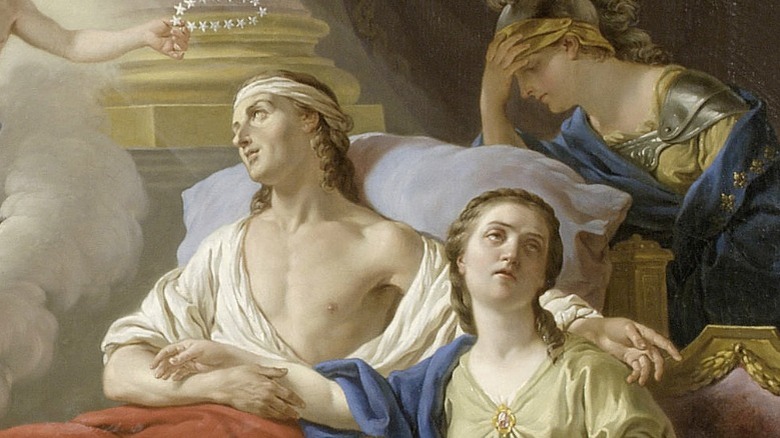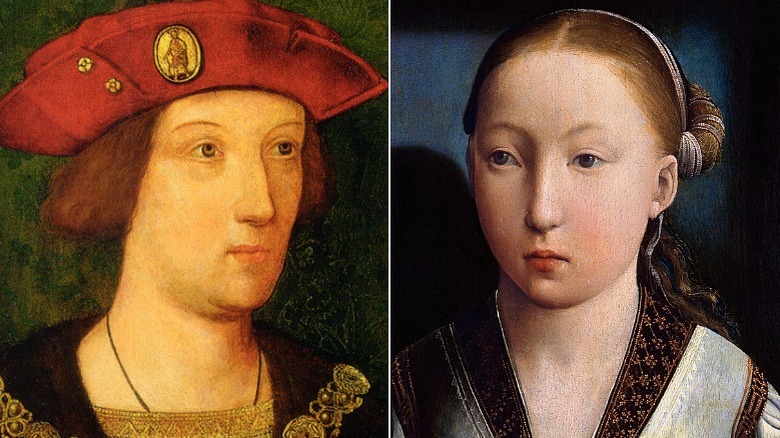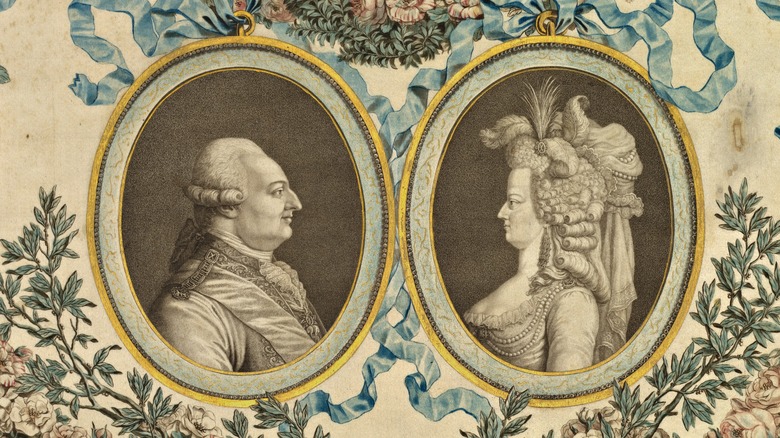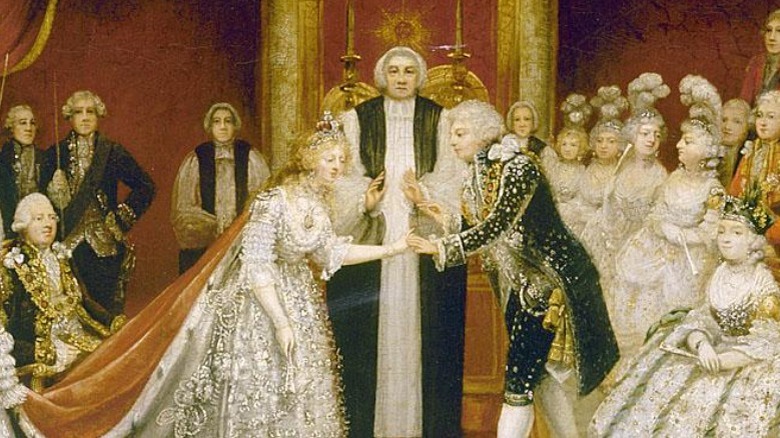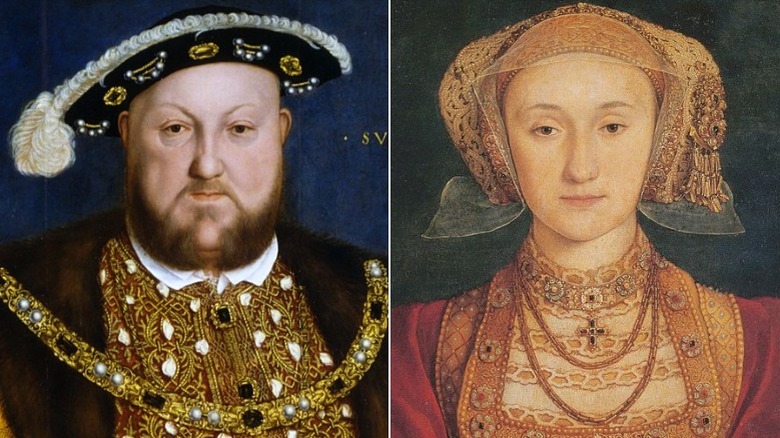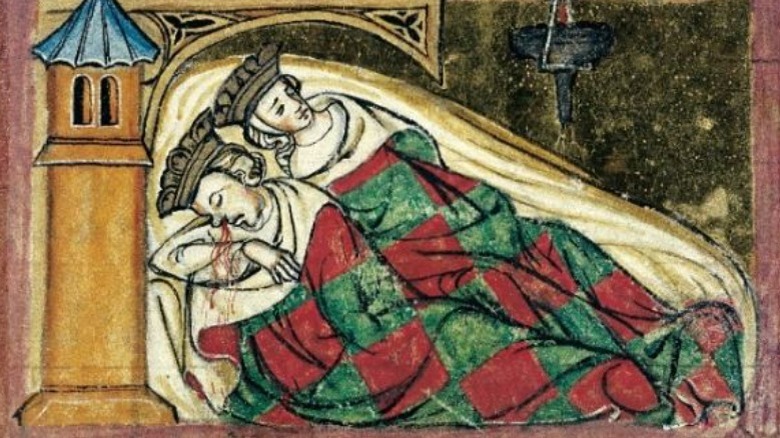The Worst Royal Wedding Nights In History
If you're a fan of historical romance novels, then a royal wedding night is supposed to be a sensual and captivating experience. It should represent the culmination of heartfelt feelings and a passionate courtship. Of course, these are idealized, contemporary expectations that often have little to do with the historical reality of actual royal wedding nights.
According to CBC News, many royal couples married with little to no courtship or even previous introductions. These weddings were motivated by politics, often with scant thought to the compatibility of the parties involved. What's more, bizarre traditions such as royal bedding ceremonies could put a serious damper on intimacy (via The Cut). While some royal couples managed to get through this embarrassment and still appreciate one another, not every couple proved this lucky. In fact, some royal weddings turned out extremely badly for all involved.
Weird traditions such as the bedding ceremony alone can't be blamed for the lack of synergy between some royal couples. This is attested by modern pairings like Prince Charles and Princess Diana who didn't have to contend with witnesses in the royal bedchamber but still managed to endure notoriously poor experiences (via Tina Brown's "The Diana Chronicles"). Here's what you need to know about the worst royal wedding nights in history, ranging from lackluster to downright awful.
Princess Diana and Charles, Prince of Wales
Few royal relationships intrigued more people than the tragically misaligned marriage of Prince Charles to Lady Diana Spencer. We can now say the marriage was doomed from the beginning, but it's easy to forget that in 1981, the public had high hopes after their fairytale wedding (via Vogue). Little did they know that the royal couple suffered through a less-than-spectacular wedding night foreshadowing the slow disintegration of their marriage, according to Tina Brown's "The Diana Chronicles."
Speaking of their wedding night, Prince Charles said, "That first night was nothing special. It was pleasant enough, of course. But she really was painfully naïve." Prince Charles wasn't the only one who proved unimpressed. Spencer might have lacked experience, but she knew enough to feel less than bowled over by her first intimate moments with him. She later recalled his performances as robotic and functional. In other words, he did what he had to out of a sense of duty.
But the princess had even more to say about the problems experienced on their wedding night. Confiding in a close friend, she categorized their lovemaking issues as "geographical" in nature. The unhappiness the princess felt on her honeymoon exacerbated issues she already faced with bulimia. Coupled with the fact Charles had to remain in constant communication with his ex, Camilla, all around it was a less than blissful newlywed experience.
Catherine the Great and Peter III of Russia
Although Sophie of Anhalt-Zerbst (she soon changed her name to Catherine) charmed the Russians upon her arrival at court from Prussia, one man wanted nothing to do with her, her future husband: Peter III (via Biography). Not only was he a trouble-making alcoholic, but he kept armies of miniature soldiers under the bed that he played with at night, according to Town & Country. These habits didn't bode well for a romantic wedding night.
Instead, Catherine waited hours for her new husband to show up. When he finally arrived in the marital chamber, sparks didn't fly. Instead, he passed out drunk. Inebriation aside, Peter III proved more interested in the aforementioned toy soldiers under the bed than having sex.
Later, Catherine claimed the couple never consummated their relationship. While she eventually had children while her husband was still alive, there is evidence other men may have fathered them. While scholars still argue over why Peter III proved so disinterested in his spirited and attractive young bride, it may have had something to do with his emotional and physical scarring, the result of surviving smallpox. What's more, well before their marriage, the duo had expressed dislike for one another, hardly the grounds for a stellar wedding night let alone a loving marriage.
Gobulo Wan Rong and P'u Yi, the last Chinese Emperor
The wedding of P'u Yi, the last Chinese Emperor, to Gobulo Wan Rong was a highly publicized event, but their honeymoon would become the focus of scandal, according to China Daily. After what many considered to be one of the most opulent weddings in Chinese history, the newlyweds were supposed to retire to the royal bedroom. But then catastrophe struck.
It started with an ominous omen, as reported by Arnold C. Brackman in "The Last Emperor." After the wedding, palace servants transported the newlyweds on a sedan chair to the Palace of Earthly Peace where tradition dictated they spend the night. Before entering the room, the emperor had to shoot three arrows over his bride to scare off bad spirits, according to Manchu tradition. But 17-year-old P'u Yi had poor eyesight and wasn't permitted to wear his spectacles during the ceremony. So, he declined to shoot the arrows to avoid inadvertently wounding his wife. But this proved just the beginning of the scandal.
Upon entering the Palace of Heavenly Peace, P'u Yi felt anything but tranquil. Surveying the chamber filled with red decorations and a big bed, he felt overwhelmed and panicked. He later recalled, "I looked around me and saw that everything was red ... it all looked like a melted red wax candle. I did not know whether to stand or sit." Overcome by anxiety, he fled the room leaving his new bride alone and confused.
Marie Josèphe of Saxony and Louis Ferdinand
Marrying into the French royal family traditionally came with the embarrassing and all-too-public bedding ceremony, as reported by The Cut. This ceremony required the newlyweds to be seen in bed together by the court's upper echelons before closing the bed curtains to let the work begin. Generally, the newlyweds only met a few hours before, ratcheting up the awkwardness that much more. Of course, some young couples faced additional challenges, rendering their wedding nights not only awkward but downright excruciating.
According to Antonia Fraser's "Marie Antoinette: The Journey," on Louis Ferdinand's wedding night with his second bride, the ritual bedding ceremony triggered bittersweet memories. It reminded the French dauphin so much of his beloved dead first wife, Marie Thérèse Raphaëlle, that he burst into tears. One can only imagine what it must've felt like to be his new bride, Marie Josèphe of Saxony.
Surrounded by eager guests waiting for the new couple to consummate their relationship, Marie Josèphe found herself at the mercy of her new husband's nostalgia. Yet, she chose an expedient and wise means of handling the situation by comforting him. While memories of his deceased wife may have put a damper on Louis Ferdinand and Marie Josèphe's wedding night, it also helped to forge a deeper connection between them and one that would endure over the course of a relationship that produced many children.
Catherine of Aragon and Arthur, Prince of Wales
When it suited Henry VIII, he claimed that Catherine of Aragon, his former sister-in-law, had never consummated her marriage to his older brother, Arthur, Prince of Wales (via History Extra). This permitted him to marry his sister-in-law, despite the Church considering them related. And it also let Catherine's parents off the hook when it came to making a providential match with England.
But when Henry VIII later sought the dissolution of his marriage to Catherine, he changed his tune. Henry VIII claimed the marriage to Arthur had, indeed, been consummated, providing the grounds for an annulment by the pope. But Catherine would have none of this. She destroyed Henry VIII's arguments by sticking to the original story that her marriage to Arthur had never been sealed with a physical act before his premature death, per William Hill's "Tudor England: An Encyclopedia."
While she admitted they slept in the same bed seven times, she claimed he proved too weak to do anything else. In other words, their wedding night and the nights following that turned out to be a major disappointment when it came to sex. Or, as Catherine eloquently put it, she "remained as intact and uncorrupted as the day she left her mother's womb." Eyewitnesses to events during her marriage to Arthur backed up these claims, saying Catherine had lamented the fact they likely would never enjoy marital relations.
Marie Antoinette and Louis XVI
According to the Château de Versailles, Louis-Auguste met Marie Antoinette only hours before their wedding, making the walk to the bridal bedchamber for the consummation of their union awkward. The Archbishop of Reims blessed the nuptial bed, and King Louis XV gave his grandson a nightshirt and some advice. The Duchess of Chartres handed Marie-Antoinette her nightshirt, and then the king kissed them both. Once they saw the young couple into bed, they left the room.
Instead of marking the start of a new family, however, nothing happened. And this nothing continued for years. Rumors have long abounded that the dauphin suffered from a genital deformity known as phimosis that made sexual arousal painful, according to a documentary produced by the History Channel. They also claim he initially refused surgery to fix the condition. After finally having it, however, the children came quickly. But there's no consensus when it comes to the king's sexual issues.
In her book "Marie Antoinette: The Journey," Antonia Fraser argues Louis XVI had no physiological problems and never had surgery. Instead, he lacked instruction. Eventually, Marie Antoinette's mother, Maria Theresa, sent her son, Emperor Leopold II, to France to investigate. After speaking with the king, Leopold chalked up the problems to inexperience, laziness, and blundering. After some frank discussions about the birds and the bees with his brother-in-law, the duo figured it out, consummating their marriage seven years and three months after their wedding ceremony.
Frederick II and Elisabeth Christina of Brunswick-Bevern
Growing up in the Prussian royal family wasn't for the faint of heart. Not only was Frederick II's father a complete psychopath, but he forced Frederick to watch his childhood friend and rumored lover, Lieutenant Hans Hermann von Kette, be executed. His friend's execution represented punishment for attempting to help Frederick II run away from home. And can you blame him?
So, when it came to a forced marriage arranged by his dad, we can only imagine the pent-up anger coursing through Frederick's veins. Maybe that's why immediately following his wedding night, he wrote to his older sister Wilhelmina, "Thank God, that is over!" (via Tim Blanning's "Frederick the Great: King of Prussia"). While we'll never know the play-by-play of what transpired behind closed doors, the couple remained notoriously distant, leading separate lives in separate cities, as reported by the Royal Collection Trust. What's more, he spoke of his wife with great disdain, referring to her as "this incorrigibly sour subspecies of the female sex."
Frederick II claimed the very word "marriage" inflicted him with acute physical pain, likening it to the bubonic plague. In the context of these strong words, hatred of his father, possible homosexuality, and the letter to his sister (per the Spectator), Frederick II and Elisabeth Christina's wedding night proved mind-blowing in a catastrophic way.
Princess Caroline of Brunswick and George IV
The marriage of Princess Caroline of Brunswick to George IV proved anything but a love match, as reported by David Soud in "Kings & Queens of Great Britain: Every Question Answered." After meeting for the first time, George — then the Prince of Wales — demanded brandy, so repulsed was he by Caroline's lack of personal hygiene and coarse manners, according to Royal Central. Of course, most people didn't describe George as marriage material, either. At 32, he'd let himself go, which meant an expanding waistline. He spent copious amounts of money on women and wine and had even secretly married another woman before Caroline. That said, the royal family found a way to negate this clandestine union, putting monetary and political advantage before happiness.
On paper, the match with Caroline looked ideal, but the reality proved downright grim. The couple passionately disliked one another. At the wedding, George was so drunk he didn't participate in portions of the ceremony. From there, his behavior descended into inebriated sobbing at the altar.
By their disastrous wedding night, George got so smashed that he fell into the bedroom grate where Caroline left him for the rest of the night, per Historic UK. Nevertheless, the marital obligations got met that night or the next day, producing their one and only child, Princess Charlotte of Wales. Thankfully, her conception let them off the hook when it came to ever sharing a bedroom again.
Anne of Cleves and Henry VIII
Henry VIII had a long history of failed marriages, and his wedding to Anne of Cleves proved especially disastrous (via History). After two years as a single man, his advisors remained in a tizzy to ensure the king produced more male heirs (his only legitimate son, Edward, was a sickly child, and a spare seemed like a good idea). Their poking and prodding finally convinced Henry to enter into a marriage agreement with the German Duke of Cleves' sister Anne. Seeing the woman's attractive portrait helped push him over.
But when the betrothed couple met before the wedding, he realized the promising portrait was a lie. Not only did she look nothing like the image, but he felt no attraction to her whatsoever. This made sealing the deal on their wedding night a serious issue.
After the honeymoon, the monarch confessed to Thomas Cromwell that he had trouble fulfilling his husbandly duties, elaborating that he "left her as good a maid as [he] found her," per Tudors Dynasty. Sadly, Anne of Cleves had so little knowledge of human sexuality that she didn't realize a problem existed. According to Hampton Royal Court, Henry VIII had already experienced intermittent episodes of impotency, but he had to find a way to save face. So, he focused on the alleged ugliness of his wife instead.
Statira and Alexander the Great
When Alexander the Great married Statira in Susa in 324 B.C., she had no allusions about her groom's fidelity (via Graham Phillips' "Alexander the Great"). After all, the young general and ruler of the known world already had another famous wife, Roxanne. What's more, it was well-known that he had once enjoyed a homosexual relationship with Hephaestion who still remained a loyal companion.
Hephaestion also proved the other groom at the wedding, marrying Statira's sister, Drypetis. But what neither bride knew was that the romance between Alexander and Hephaestion had rekindled en route to Susa. Alexander and Hephaestion spent far more time together than he did with any of his women.
Nevertheless, it still shocked Statira to get dumped on her royal wedding night in favor of her new brother-in-law. Alexander and Hephaestion spent the night sequestered together, leaving both of their brides out in the cold. The Macedonian king's choice of companion on this second wedding night horrified his first wife, Roxanne, who hailed from the Sogdians. This tribe believed a husband's homosexual dalliances reflected directly on his wife's honor and femininity, which Phillips hypothesizes may have provided a strong motive for her to later poison Alexander and Hephaestion.
Mary II and William of Orange
Before his wedding, rumors swirled about William III, the Prince of Orange's sexual orientation, per History Ireland. The royal wedding night did little to assuage the gossip, as reported in James Johnson's "A Profane Wit: The Life of John Wilmot, Earl of Rochester." In fact, the cool reception he showed his bride, Mary II, on their honeymoon soon became the fodder of gossip among Europe's nobility. Just 15 years old, Mary II had cried for days after learning she had to marry her 26-year-old cousin, which likely put an extra damper on the whole situation.
William of Orange kept his bride and the king of England, Charles II, waiting until midnight while he went into town to grab a bite to eat. His lack of interest and presence at the bedding ritual raised eyebrows. What's more, when he arrived for the big event, he refused to remove the woolen drawers he wore. When the king of England suggested he remove them, he said simply he'd grown accustomed to wearing them to bed and wasn't about to change.
Adding to the awkwardness of the whole event was Charles II. According to Kevin Haddick-Flynn's "Orangeism: A Historical Profile," the king acted drunk and cheered on the newlyweds, proclaiming, "Now nephew, to work! Saint George for England!" Despite the English king's enthusiasm, the couple never welcomed an heir.
Atilla and Ildico
One of the most feared warriors to ever ride across the plains of Europe was Attila the Hun, per History. Because of his fearsome reputation, the Romans named him "Flagellum Dei," which translates as the "scourge of God." He only ever suffered one defeat, which came at the Battle of the Catalaunian Plains to a combined force of Romans and Goths. This military resume makes his gruesome death on his wedding night all the more bizarre.
Atilla had many wives when he decided to add a woman named Ildico to his Germanic harem. At the time of their nuptials in A.D. 453, he was making preparations for his troops to invade the Eastern Roman Empire, targeting Marcian, its new emperor. The wedding took place at Attila's palace and involved plenty of indulging, including feasting and drinking. Attila stayed up partying into the wee hours of the morning before he finally showed up in the bedroom where Ildico patiently awaited her new husband.
What happened next remains a mystery. The next morning, guards heard sobbing coming from the bedroom and broke down the door. They found Attila dead inside with Ildico inconsolable by his side. Examination of his body showed he didn't have any visible wounds. But it was obvious he'd suffered a nosebleed in the night, which historian Priscus of Panium concluded had caused him to choke to death on his own blood, per ThoughtCo. Talk about an awful wedding night!
